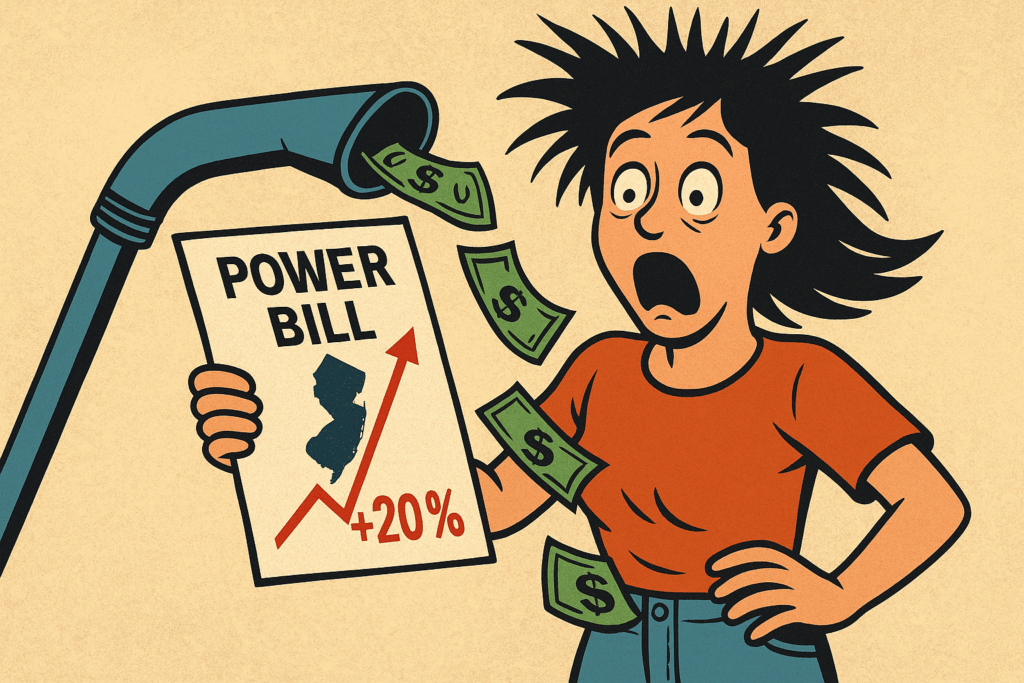
If you thought property taxes and home insurance were already crushing your budget, here comes another hit. As of June 2025, electricity bills in New Jersey jumped between 17 and 20 percent. Some New Jersey residents are claiming even higher. For homeowners in Bergen County and North Jersey, this means another drain on their finances for the same amount of electricity.
And here’s the bigger picture: many New Jersey homeowners already pay over $130 per month on electricity, and for households with higher usage, monthly bills can climb to $280–$300 or more. These are some of the highest energy costs in the country, stacked on top of the nation’s highest property taxes and rising insurance premiums.
So why are your bills suddenly higher? Who is responsible? And is Governor Phil Murphy to blame? Let’s break it down clearly.
Who Controls Your Power Bill 🏢🔌
To understand what happened, you need to know the main players:
- PJM Interconnection (PJM): This is a regional electricity grid operator that covers 13 states, including New Jersey. PJM runs the wholesale energy and capacity markets, which basically set the price utilities must pay to secure enough power for future demand. When PJM’s prices rise, your bills in New Jersey rise right along with them.
- New Jersey Board of Public Utilities (BPU): This is the state regulator that oversees energy, water, and telecommunications. The BPU runs the annual electricity auction, known as Basic Generation Service (BGS), which sets the supply rate most customers pay.
- Regional Greenhouse Gas Initiative (RGGI): This is a multi-state carbon reduction program. Power plants have to buy carbon credits, and while the proceeds fund clean energy projects, the cost of those credits can get passed through to customers.
- Payment Assistance for Gas and Electric (PAGE): This is a New Jersey program that helps low- and moderate-income families pay their bills. If you qualify, PAGE can provide relief, but it is not a solution for middle-class families being squeezed.
- Legacy Riders: These are extra line items on your utility bill that fund past political decisions and programs. For example, the Societal Benefits Charge funds renewable energy and environmental programs. Riders never seem to go away, so even when the base price of electricity stabilizes, your bill is still padded with these surcharges.
Why Rates Just Spiked 📈🔥
The sudden 17 to 20 percent increase came from this year’s Basic Generation Service auction, which locked in higher wholesale costs. Utilities like PSE&G (Public Service Electric & Gas), Jersey Central Power & Light (JCP&L), and Rockland Electric Company all raised rates starting June 1, 2025.
The reason? PJM’s capacity market prices exploded. More demand from new industries like data centers, fewer power plants due to retirements, and delays in building new supply all collided. New Jersey relies heavily on PJM, so when capacity costs jumped, our bills went up almost overnight.
Why New Jersey Gets Hit Harder Than Other States 🏠💰
Two big reasons explain why New Jersey households feel this pain more than others:
- Dependence on Regional Markets: Because New Jersey imports much of its electricity from PJM, any market spike hits us full force.
- Already High Costs: Even before the June 2025 hike, New Jersey power costs averaged around 20 cents per kilowatt-hour, which was well above the national average. So when prices go up, the dollar impact here is worse than in cheaper states.
What About Governor Murphy? 👀🏛️
Governor Phil Murphy did not directly cause the June 2025 spike, which was driven mostly by PJM’s capacity prices. However, state policy decisions have made New Jersey’s energy costs structurally higher than in many other states.
- In 2018, the Clean Energy Act expanded renewable energy targets. While the goals are important, they add compliance costs.
- Also in 2018, Murphy signed legislation creating Zero Emission Certificates (ZECs), which were surcharges on your bill to keep nuclear plants running. Those expired in June 2025, but for years, customers paid extra to subsidize them.
- New Jersey also rejoined RGGI under Murphy, which funds green projects but adds costs to power producers.
So while Murphy didn’t “cause” the June price spike, his policies contribute to the overall high cost structure New Jersey homeowners face every single month.
Bergen County and North Jersey Impact 🗺️
If you live in Bergen County, you are most likely serviced by PSE&G, the largest utility in the state. Parts of northeastern Bergen County, near the New York border, are covered by Rockland Electric Company. Both utilities passed along steep increases from the June 2025 auction.
For a Bergen County homeowner already paying $250 or more per month, this hike can easily push summer bills over $300, especially with air conditioning running.
Other States Where Power Is Cheaper 🌎💡
Thinking about moving? Here are states with some of the lowest electricity costs in the nation:
- North Dakota, Nebraska, Idaho, Missouri, and Arkansas: 11 to 12 cents per kWh
- Wyoming, Louisiana, Oklahoma, and South Dakota: also in the 11 to 13 cent range
Compare that to New Jersey’s 20 cents per kWh, and you see why homeowners in other states are paying almost half as much for power.
What Can Homeowners Do? 🤔
Here are your realistic options:
- Check for credits: The BPU and utilities sometimes approve temporary bill credits, but these are short-term band-aids.
- Use PAGE if you qualify: If your income fits the program guidelines, apply for Payment Assistance for Gas and Electric.
- Audit your supply: You can shop for third-party suppliers, but be careful. Many teaser rates jump after a few months.
- Face the bigger truth: The reality is that electricity, taxes, and insurance will keep New Jersey at the top of the “highest cost of living” list for years to come.
Feeling Overwhelmed? It May Be Time to Sell 🏡➡️🌴
If you are tired of the constant financial pressure, you are not alone. Many New Jersey homeowners are deciding it is not worth it anymore. Between sky-high electric bills, the highest property taxes in the country, and insurance premiums that keep rising, staying here feels like a financial trap.
Relocating to a state with lower costs could save you thousands every year, not to mention give you a better quality of life.
👉 If you are considering selling your New Jersey home, I can help you explore your options—whether that means a full-market listing or a fast cash offer. Let’s talk about how you can leave the stress behind and start fresh in a state where your money goes further.

